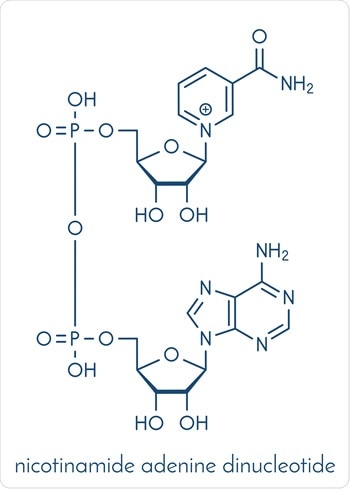Skip to:
With the recent advancement in aging and longevity research, newly emerging scientific evidence claims that NAD boosters can promote the lifespan of mice. However, it is still uncertain if the similar effects can be extrapolated to humans as well.
What are NAD boosters?
Nicotinamide adenine dinucleotide (NAD) is one of the indispensable cofactors in the body that plays a crucial role in redox regulation and also acts as a signaling molecule in various metabolic and other biological pathways. The terms NAD+ and NADH refer to oxidized and reduced forms of NAD, which are prerequisite for over 500 enzymatic reactions in several biological processes.

Nicotinamide adenine dinucleotide (NAD+) coenzyme molecule. Important coenzyme in many redox reactions. Image Credit: StudioMolekuul / SHutterstock
NAD boosters are small molecules that are required to increase cellular NAD+ levels. These molecules are particularly promising because of the anti-aging or lifespan-promoting effects. With age, a depletion in NAD+ level occurs, which is considered as a hallmark of aging. A depleted NAD+ level is also associated with many age-related disorders, such as metabolic disorders and neurodegenerative diseases. Some animal studies have indicated that an increase in cellular NAD+ level can significantly slow the aging process, as well as delay the onset and progression of many age-related disorders.
In general, NAD+ level can be increased by supplementing NAD+ precursors, increasing NAD+ synthesis, or inhibiting NAD+ degradation.
What are the effects of NAD boosters?
A wide-range of studies in mice have suggested that NAD boosters are effective in improving cognitive and sensory functions as well as survival in mammals. These compounds are also important regulators of many metabolic pathways, including gluconeogenesis, lipogenesis, and insulin metabolism. Regarding disease-preventing effects, NAD boosters are known to protect cardiovascular and kidney disorders by increasing endothelial cell proliferation and reducing inflammation, respectively. They are also effective in improving fertility in both male and female mice.
Despite having a large pool of evidence on longevity-promoting and disease-preventing effects of NAD boosters in animals, it is still a key question whether the same effects can be expected for humans as well. Todate, there is no direct scientific evidence claiming that NAD boosters are effective in promoting longevity in humans.
In humans, it has been found that one of the NAD boosters, niacin, can effectively reduce the cholesterol level in the blood; however, it is not clear from the literature whether the observed effect is due to an induction in NAD+ level.

Foods containing vitamin B3 (PP, niacin) and other natural minerals, Image Credit: Morisfoto / Shutterstock
The hype
Public interest in the alleged lifespan-promoting effect of NAD boosters in humans has been encouraged by statements like those made by Professor David Sinclair from the Harvard Medical School Genetics, who promoted the potential of NAD boosters and in 2004 co-founded a company to test their potential benefits.
With this claim, a potential NAD booster, nicotinamide riboside, has been commercialized as a nutritional supplement; however, the clinical benefits of the supplement in humans remain unproven. Based on the data presented by the manufacturing company, the supplement is effective in increasing the level of NAD+. However, no data has been presented to show whether it provides any anti-aging benefit.
How effective and safe are NAD boosters for humans?
According to the FDA, aging is a natural physiological process and not a disease. Thus, any compound/medicine designed to increase lifespan cannot undergo clinical trials for checking the safety and efficacy levels in humans. In most cases, medicines that show promising outcomes in animal studies fail to show health benefits in humans. This is primarily because of the difference in basic metabolism patterns. Another important reason is the influence of various environmental factors on human physiological systems, which is absolutely different from that observed in animals kept in controlled experimental condition.
Although NAD boosters are claimed to be safe for humans, it has been found that repeated intake of it can increase the total cholesterol and low-density lipoprotein (LDL)-cholesterol levels in the blood. Moreover, studies have indicated that increased expression of NAMPT (a major NAD+-producing enzyme) is associated with an increased risk of developing potentially fatal brain tumors (glioblastoma). NAMPT promotes rapid tumor growth by increasing the release of inflammatory and oncogenic molecules.
In conclusion, the anti-aging efficacy of NAD boosters in humans is not proven and more solid research is needed to establish a link with other important cellular processes, and determine their safety.
Further Reading
Last Updated: Feb 9, 2020